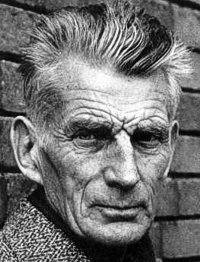Post-1945 Theater
Influenced by the drastic
events of WWII: 61 million lives (civilian and military) lost
- 1945 Bombing of Hiroshima, Nagasaki; liberation of Jewish
concentration camps; Estab. of USSR; Estab. of
United Nations; US military occupies Japan; US, France, Britain, and
USSR occupy Germany; France leaves Syria and Lebanon
- 1947 Indian
independence: Pakistan, India divided; Britain leaves Palestine
- 1949 Estab. of GDR,
People’s Republic of China; Beginning of Cold
War: NATO vs. Warsaw Pact
Post-modern theater vs.
Classical theater
1. Aristotle’s theater = Neoclassical
- Structure: 5 Act play
(Horace)
- Time: Action of play
occurs in one day
2. Postmodern theater: Fractured structure, time, and action; ‘lowly’
characters
The “Theater of the Absurd”
(term coinced by theater critic Martin Eisel in 1961)
Samuel Becket Biography
(Brief Highlights)
- 1906: Born to Anglo-Irish middle class family
- 1923-27: B.A. in French and Italian from Trinity College in Dublin
(favorite author: Proust)
- 1928: Teaches at École Normale Supérieure in Paris;
meets Joyce and helps him with Finnegan’s
Wake
- 1930: Whoroscope (poetry)
- 1933: Psychotherapy in London after father’s death
- 1938: Novel, Murphy; living
in Paris permanently
- 1941: Joins French Resistance
- 1948-49: En attendant Godot
(Waiting for Godot)
- 1951: Molloy
- 1953: Waiting for Godot
produced at Théâtre de Babylone
- 1957: Fin de partie (End Game); prisoners in San
Quentin, CA watch a performance of Godot
- 1961: Marries
- 1964: Film
- 1969: Nobel Prize in Literature
- 1989: Dies same year as his wife
Existentialism FAQ
- “Nothing to be done” (Beckett
2).
-
WWII ended the international exchange of artistic, scientific ideas.
In fascist countries, the intelligentsia were brutally persecuted.
- In the postwar world, existentialism symbolized the isolated
individual and his abandonment.
- Existentialism served to brace the individual for survival in a
failed, fallen, and no longer trustworthy world.
-
"Existentialism is the set of philosophical ideals that
emphasizes the existence of the human being, the lack of meaning and
purpose in life, and the solitude of human existence . . .
Existentialism
implies
that the human being has no essence, no essential self, and is no more
than what he is . . .
In their treatment of ‘freedom,’ Existentialists imply that humans
are free to do as they please; after all, there good and evil do not
exist, only existence. But they also show that humans are a product of
situations of their own making" (Akram 1986).
- Cross reference Kierkegaard (1813-1855), Nietzsche (1844-1900 [“God
is dead”]), Camus (The Stranger), and Sartre (1905-80 [“Hell is
other people”])
- See this good site on Existentialism: http://www.bradcolbourne.com/existentialism.html
Works
Cited
Akram, Tanweer. "The Philosophy of Existentialism." New Nation
1986. Essays on Existentialism. Ed. Brad Colbourne.
<http://www.bradcolbourne.com/exist.html> Accessed Apr. 2007.
Interpretive
Questions
ACT I
1. What does Waiting for Godot seem to say about
language? Consider
Vladimir's carrot (16); Pozzo's commands (20) and need
for
permission (37); difficulties speaking (30); and/or
Lucky's speech (44-47).
2. What basic questions does Beckett’s play seem to raise about human
nature?
3.
Beckett subtitles
the play a “tragicomedy.” How does the tragic combine with the comic,
and the comic inform the tragic?
ACT II
1. What do the leaves
on the tree represent?
2. What lines,
gestures, and/or actions are repeated and by whom (from the first and
in the second act, for ex.)? What is the significance of these
repetitions?
3. Is the play set in
the past, the present, or the future? Is time (both the passing of time
and the setting) important here?
4. How does Beckett make an effective drama out of a play in
which nothing (apparently) happens? (Estragon: “Nothing happens, nobody
comes, nobody goes, it’s awful!” [43].)
Wendy C. Nielsen, "Waiting for Godot," Modern European Drama
(Spring 2007), Last updated Apr. 2007

